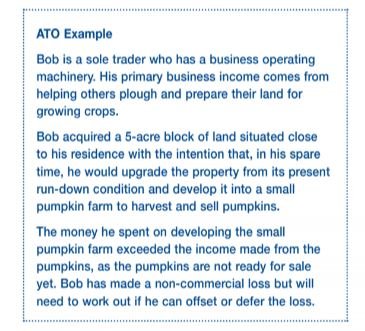Claiming Business Losses
You may be able to offset your business loss against other income (such as salary and wages) if you’re a sole trader or in a partnership.
Firstly, however, your loss must not be non-commercial. A non-commercial business loss is a loss you incur, either as a sole trader or in partnership, from a business activity that is not related to your primary source of income. This type of business activity could be a hobby or lifestyle benefit.
Even if it has business-like characteristics, if it is unlikely to ever make a profit and doesn’t have a significant commercial purpose or character, you can’t offset this non-commercial business loss against your other income. In this case, you can defer the loss until you make a profit from the business activity. This applies whether your business loss is from an Australian or a foreign source.
If your loss is indeed commercial, then that is just the first step to potentially claiming your losses. Generally, the following tests must also be met (though they differ slightly for partnerships).
1. ASSESSABLE INCOME TEST
To pass the assessable income test, assessable income from your business activity during the inancial year must be at least $20,000.
2. PROFITS TEST
Your business will pass the profits tests if it has made a tax profit in three out of the past five years (including the current year).
3. REAL PROPERTY TEST
You will pass the real property test if real property of at least $500,000 in value is used in your business activity on a continuing basis.
4. OTHER ASSETS TEST
You will pass the other assets test if the value of the“ other assets” you use in your business on a continuing basis is at least $100,000. Only certain assets are included in this test and some are specifically excluded.
If you pass any of these tests, then generally you must also earn less than $250,000, otherwise your loss maybe deferred until this test is met.
To sum up, if you’re an individual in business, as either a sole trader or in a partnership, and your business activity makes a loss, we can help you work out if you need to:
■ claim and offset the loss against your other income, such as salary and wages
■ defer the loss and claim it in a later year – if you do not pass the non-commercial loss rules above.


